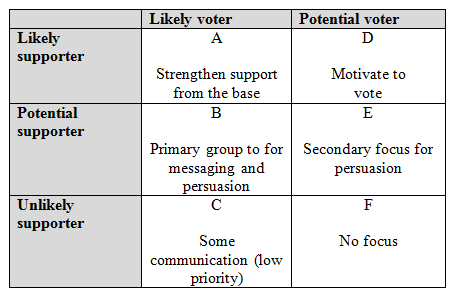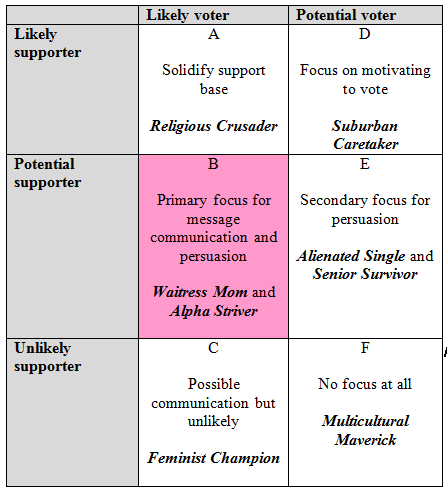
The Republican outreach to women is “awful” not only because they don’t let women speak for themselves—using instead canned and contrived ads where women awkwardly parrot consultant talking points—but because they don’t seem to understand which voters they actually need to reach.
Bill Scher, in a recent post at Real Clear Politics, has done something many Republicans have failed to do: he admits the Left is using an effective “war on women” ploy. GOP consultants and pundits often diss this strategy, not just because it’s admittedly and irritatingly absurd, but because of polls that show most Americans see the war on women as a “political tactic.” They also point to elections in which conservative candidates get a majority of the women’s vote (albeit a majority of “married women’s” vote).
The problem with these analyses is that, even in the Rasmussen poll, more women still think the war on women is real compared to men, and the poll doesn’t break down the women into single and married. It’s likely single women think the war is more real than their married counterparts—as indicated by the higher number of young people who think the war on women is real. This is also true of elections, where an overwhelming majority of single women vote for Democrats (Obama got 68 percent of the single women’s vote in 2012), and they are usually highly motivated by the war on women.
In other words, the war on women is real to single women—and they’re the ones making a difference in tight races as they’re specifically targeted by Democrat candidates, especially in last-minute get-out-the-vote efforts. They’re also the fastest-growing demographic in America.
The War on Single Women
It would help the GOP and doubting pundits to realize that the war on women is really the “war on single women.” Only by grasping this reality will the GOP develop an effective outreach. But it doesn’t stop there: single women voters are not a monolithic group. They’re not all alike, and they can’t be treated the same. They have different values, and they’re affected by issues in different ways—and the GOP needs to figure out which of these single ladies they can actually persuade to vote for Republican candidates.
With these women in mind, they need to focus, hone their message, rebuild trust, be authentic, reflect strength in their advocacy of conservative principles, and communicate those principles in a convincing and compassionate way.
As you will see from my analysis below, this narrows the target voting audience to a rather small group (or groups) compared to the wide net of all women or even just single women in general. Some might question whether it is even worthwhile to focus advertising on such a small group. The answer is an emphatic yes. When you are in a tight race, every vote matters, and if you can persuade a group of swing voters to break for the GOP, you will win. Also, even when you are focusing on one group of women, a well-fashioned ad will also appeal to the GOP base of married women voters and motivate them to show up to the polls as well.
This Isn’t Identity Politics
Before I continue, I want to make it clear that when I am talking about communicating to a specific group, I am not talking about pandering or identity politics or tailoring policy to meet the desires of a faction (God forbid!). I am talking about wisely crafting a message and talking to voters in a relevant and meaningful way that will convince them to vote for the GOP and conservative principles—principles that will get our country back on track.
Note that conservative principles are significant: before the GOP can communicate to anyone, it has to decide what it stands for. I believe conservative (and libertarian) principles of smaller government, free markets, individual liberty, personal responsibility, and a strong national defense (and policies that flow from those principles) are the winning message—even among single women voters—if they’re communicated well and if these women see the relevance of those principles in their personal lives.
As Democratic pollster Celinda Lake said, women want to see themselves in the political landscape. When they hear politicians talk, they want to see how the message applies to them, specifically—how does it “reflect their image,” and how is it meaningful to them. Because conservative principles of freedom and equality before the law, individualism and local community, are timeless and applicable to all people no matter their situation, they can be applied to the single lady not only effectively, but powerfully. The GOP just needs to do it.
The Eight Types of Women Voters
So what about these single women? Who are they? Celinda Lake and Kellyanne Conway help us with this immensely in their book, “What Women Really Want: How American Women Are Quietly Erasing Political, Racial, Class, and Religious Lines to Change the Way We Live.” Lake and Conway divide women into eight groups. These groups comprise both married and single, but for the sake of developing a GOP communication strategy, we will focus on the single women.
The Feminist Champion. This woman is the politically engaged liberal. Think of Hillary Clinton and any other highly educated, ambitious feminist activist. She is mostly secular and pro-choice. “Devoted to her career and community, she is strongly motivated by values of equality and opportunity.”
The Suburban Caretaker. Married with children, she is the homemaker, usually white and suburban, in her thirties and forties. She stays at home or works—usually part-time. “Spirituality, and often religion, are important to her, and she views herself as the caretaker of the emerging generation, making her deeply invested in the moral standards of her community and nation. She focuses on education and health care and now tends to be a conservative ‘values’ voter.”
The Alpha Striver. Lake says this woman “didn’t get the memo that women can’t ‘have it all,’ and she is determined to excel both professionally and personally.” She’s the business woman, the entrepreneur. “Relatively liberal and engaged politically, she views herself as an agent of change. You might find her at a corporate conference, a county board planning meeting, or taking her high schooler on college interviews.”
The Multicultural Maverick. Think coffee shops, organic food, and Indie music. This woman is “young, single, urban, and multiethnic . . . she is an individualist rather than a joiner, attracted to entrepreneurial endeavors.” (Hashtag campaigns and global issues appeal to this woman.) “Although she tends to be liberal in her political views, she is somewhat indifferent about voting, and she distrusts most politicians.”
The Religious Crusader. This is the woman of faith who looks at issues “through the prism of ‘right vs. wrong’ rather than ‘right vs. left.’ A politically active Christian conservative or church-going Catholic, this woman in her forties is financially upscale, married, and a mother. If she works outside the home, it is in her own business or in a career that provides a great deal of flexibility.” This woman is politically active and pro-life. (You usually see her toe-to-toe with the Feminist Champion at an abortion rally.)
The Waitress Mom. Usually blue-collar, this woman is concerned about “achieving balance in her life and greater educational and financial opportunities for her children.” While many in this group are married, some are split between being single, divorced, and widowed. “She tends to be a conservative-leaning moderate, a reliable voter who may swing’ to support candidates who address her core concerns of health, security and the economy. She considers herself a person of faith, but she does not regularly attend religious services. You are most likely to see her working a forty-hour week.”
The Senior Survivor. “This over-65 grandmother is security-and health-conscious and may be either financially struggling or financially set, depending on her retirement means and monthly prescription bills. Politically centrist, she votes in nearly every election, and tends to support incumbents and the status quo.” If she is in good health, this woman cares for her grandchildren and volunteers in the community. If she’s not well, she is lives with her children or in an assisted-living residence.
The Alienated Single. This woman isn’t doing too well economically, and she is politically disengaged. She tends to be young. She is usually divorced or never married. She might have children or she might not. “She is the least religious and the least educated of any group. Lacking a meaningful affiliation with a religious organization or supportive community, she tends to fly under the radar. She feels that she has little control over her future and worries about how she will take care of herself as she ages and is faced with health issues. Although she identifies herself as politically independent, she is usually not registered to vote.” Unlike many of the other women, she is the “least likely to be an agent of change, but she may be the beneficiary of changes others produce.”
Now, to the Vote Matrix
So, which of these women should be the focus of a GOP election campaign? An outline of likely voters might help. Here is a table of how likely and potential voters are to be considered in a campaign:
 Now, let’s plug the groups of single women as defined by Lake and Conway into our table as we apply it to a GOP campaign strategy:
Now, let’s plug the groups of single women as defined by Lake and Conway into our table as we apply it to a GOP campaign strategy:
 This is my thinking behind these choices.
This is my thinking behind these choices.
The GOP base is clearly the Religious Crusader and Suburban Caretaker. The politically active and morally conscious Religious Crusader is more likely to vote than the Suburban Caretaker, which is why she is in Box A. It is the goal of the GOP not to do anything to anger these groups so they stay home (i.e., dissing the Tea Party or social conservatives with demeaning comments). These are trustworthy voters. Show them respect, and you have them.
The Suburban Caretaker can be a little more slippery. She can go into the voting booth and flip the lever for a Democrat (contra husband, even without him knowing it) because she can be influenced by negative war-on-women rhetoric. It’s key to focus on issues like Common Core and Obamacare for this woman because she cares about her children and likes being involved in her local community (as does the Religious Crusader).
There doesn’t need to be a lot of focus on these women in a campaign—just enough to shore up the base and motivate them to turn out to vote.
The bottom row—the Feminist Champion and the Multicultural Maverick—are beyond the scope of the GOP, practically speaking, although there might be some progress made with the Multicultural Mavericks in the long term if you focus on the advantages of governing locally and tying in their community-organizing and individualist concerns to caring for people at a local level and getting a corrupt big government out of their lives (libertarians can gain a lot of ground with this group). This, however, will be a long-term project (but a worthy goal) because these women have been highly influenced by a Progressive education and oftentimes have a global mindset even as they are attractive to localism (such as “Eat and Shop Local”).
The focus of the GOP is the middle row, with the primary focus on the Waitress Mom (Box B) and a secondary focus on the Alpha Striver. Progress might also be made with the Alienated Single if you can get them to show up to vote and if they think the candidate has a real plan to make their life better. Showing these women how local governance is better for them because they’ll actually get the support they need from people who know them will help. But again, they’re unreliable voters, and they find social programs appealing.
The Senior Survivor is a more consistent voter and could be persuaded to vote for a GOP candidate, even a challenger, if she believes his or her plan would actually improve the economy and bring more security to the nation.
How to Reach Blue-Collar Women
The Waitress Mom—the woman Republicans need to focus on in communication and persuasion strategies (as well as get-out-the-vote efforts)—crosses two demographics that the GOP needs: single women and blue-collar voters. According to Lake, she is also equally pro-life and pro-abortion.
As an aside, this is the kind of voter a candidate like Mitt Romney would have great difficulty reaching—and he did. He’s married, rich, and disconnected from blue-collar sensibilities (or, fair or not, appears to be). His perfect family imaging did nothing to appeal to the single Waitress Mom. In a state like Ohio, for instance, these women will be lost by a candidate who does not have the ability to effectively communicate with her about things she’s dealing with every day. As Lake says, “Politics is personal. That’s a fact of being human, and it’s a facet of being female.”
As with the other single women, this woman cares about jobs, the economy (along with, according to Lake, retirement, health care, and national security), but also about community (she wants and needs it even if she doesn’t always have a sense of it). She works hard, she’s tired, she’s often alone in making big decisions, she’s worried about the future, and she doesn’t trust the government.
The best way for the GOP to reach this woman is to show (not only tell) her that she is part of the American community and she is not alone, she doesn’t have to be afraid about the future, and there are people in her local sphere who will help her—through job opportunities, childcare, private associations—if only they are freed from the massive federal government to give her the attention, the care, and the support she really needs. This woman needs to see herself in the context of a compassionate, free America where people turn to one another and experience real opportunities rooted in hard work and individual initiative instead of relying on the empty promises of big government.
She doesn’t want to see wealthy candidates telling her what they can do for her (although she can be affected positively by wealthy candidates who do this, especially if their wealth isn’t their number-one characteristic in the eyes of the public and if they’re highly empathetic—think of Bill Clinton’s “I feel your pain” and you get the picture). She wants empathy, connection, and practical assurances that her future is bright and that she doesn’t need to be worried. This woman needs to be persuaded that it’s not right that Washington is wasting her money and threatening her economic security through supporting amnesty and propping up Wall Street.
A Hope for the Future
Whatever the issue that is presented to the Waitress Mom—be it Obamacare, reducing taxes, immigration reform—she needs to believe in the positive ideals of America again, and particularly the power of the local American community. Ads focusing on this woman need to be heartfelt, authentic, and compassionate, recognizing her struggles as real. She doesn’t want empty promises. She wants peace and hope. She wants the best for her children, and she will support the candidate who understands her and her situation best. This doesn’t mean she automatically gravitates to more government programs that will grow her dependence on the state. The Waitress Mom isn’t the Alienated Single. This woman works hard for a living. She has kids who depend on her. She is an individual, noble, and proud. But she’s giving up hope.
Only conservative principles of freedom, local communities caring for one another, national security, and opportunity through individual enterprise will give this woman what she’s looking for. She just needs to see it and believe it; she needs to see her life connected to those principles and to an America that is truly compassionate and strong, where everyone is treated equally before the law and the rich don’t ride on the backs of the poor through crony corporatism and back-room deals.
She needs to see images of strong communities where people get to keep more of their own money so they aren’t struggling to make ends meet. She needs to see people free to help one another instead of turning to a distant, unreliable, and corrupt bureaucracy. This woman needs a positive outlook. She needs her faith restored in the American ideal of freedom and equality where life is full of endless possibilities.
The single Waitress Mom already knows the government can’t really give her those things—she already has deep-seated distrust of the bureaucracy—so don’t pretend that it can. In fact, build on that distrust. Show her that only by unleashing the private sector, freeing individuals to pursue their dreams, and encouraging people to help one another locally, America will be great again. When that happens, she will have the financial security she wants, she will look to the future with hope and expectation, her children will thrive, and she will have the peace and happiness she longs for.
Communicate this message to her, ask her to join you in attaining that goal and living that dream, and you will win not only her vote, but her loyalty to something bigger and stronger and more significant—you will win her devotion to the conservative principles that make our country the most free, the most prosperous, the most compassionate nation in the world.
That kind of victory isn’t just about winning elections. It’s about saving our nation—not for the sake of a political agenda, but for the sake of every American and every single woman who works hard to make life better not only for herself, but for those she loves.









